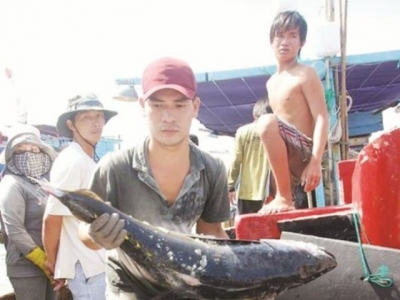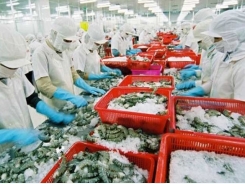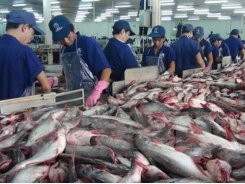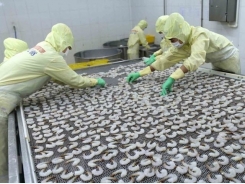Seafood export: Looking forward to removing the yellow card

The European Commission (EC) is coming up with a final assessment and conclusion on the removal of the “yellow card” for Vietnamese seafood. On the basis of satisfaction with the progress made in remedying the recommendations from the EC, the fisheries sector is expecting a "yellow card" to be removed or delayed for a short time.
Around Vietnam, there are also some countries that have been subjected to EC "yellow cards", but no country has been removed after 6 months. Picture: Ha Phuong.
Clear progress
On 23rd October, 2017, the EC announced the warning yellow card for Vietnam's seafood export products to the European Union market. At the same time, the EC made nine recommendations that Vietnam should implement immediately in 6 months (from 23rd October, 2017 to 23rd April, 2018).
According to the Minister of Agriculture and Rural Development Nguyen Xuan Cuong, Vietnam has focused on implementing synchronously and drastically the actions under the 9 recommendations of the EC; Take initiative in building a sustainable fishery, a responsible fishery and adhering to international regulations.
Specifically, in the past five months, Vietnam has focused on revising the legal document system, focusing on the Fisheries Law of 2017 passed by the National Assembly. The content of international fisheries management regulations as recommended by the EC has basically been codified in the Fisheries Law of 2017. While the Fisheries Law of 2017 has not yet entered into force, the Prime Minister, Ministry of Agriculture and Rural Development, People's Committee of provinces has issued Directive and Action Plan to immediately implement the recommendations of the EC.
"The Government has agreed to set up an inter-agency working group which will assign the Minister of Agriculture and Rural Development to be the leader to direct and urge localities and related parties to implement the national anti-exploitation action plan for illegal, unreported and unregulated (IUU) as regulations. The authorities have focused on raising communication and awareness for fisheries management agencies, businesses, and fishermen etc., to change awareness as well as exploitation, trading and IUU exploited seafood", Minister Nguyen Xuan Cuong emphasized.
In fact, in the implementation of the EC recommendations, in the last five months, apart from step by step the legal framework towards sustainable capture, fisheries have been gradually improved. Enhanced monitoring of fishing vessels, patrols and maritime controls have step by step prevented, minimized and progressed to phase out IUU fishing in foreign waters.
In response to the question asked by the correspondent of the Customs Newspaper on the outstanding results achieved by the efforts to overcome the EC recommendations, Deputy Minister of Agriculture and Rural Development Ha Cong Tuan said: the situation of fishing vessels and fishermen who illegally exploit seafood in foreign waters has been significantly reduced. Especially, to date, there are almost no Vietnamese fishing vessels in the Pacific Islands. At present, only cases of fishing vessels and fishermen have been arrested and dealt with in the overlapping sea areas. The dispute has not been clearly delineated between Vietnam and countries such as Malaysia, Indonesia and Cambodia. Thanks to the intensification of information and communication on mass media from the central to local levels, people and fisheries managers have been aware of the IUU exploitation.
Persist in building sustainable fisheries
Deputy Minister Ha Cong Tuan expressed his view: "Vietnam is pleased with the progress made in its efforts to overcome the recommendations of the EC. These are not countermeasures that Viet Nam will continue to strive to ensure the sustainable development of fisheries in the future".
Deputy Minister Ha Cong Tuan added: Recently, Vietnam has sent high-level delegation with representatives from many ministries and sectors, of which the Minister of Agriculture and Rural Development headed the delegation to work directly with the EC. The EC has acknowledged, appreciating the positive changes from Vietnam. However, looking directly at the reality, Vietnam is also facing many difficulties, need to have a roadmap to handle problems, achieve the desired goals from the EC. "There are tens of thousands of ships with tens of thousands of fishermen on the sea, which is very large, so it is not easy to do well in a short time. In addition, the control of the port has many issues to draw experience to ensure traceability of goods. In addition, the coordination between sectors from information sharing to action, especially the coordination on the sea is more difficult. Equipped with modern equipment to control the fishing vessel's voyage, however, the investment is not much, not all vessels have positioning equipment", Deputy Minister Ha Cong Tuan analysis.
Currently, the EC has agreed in late April or early May to send the delegation to Vietnam to assess the reality, then consider whether to withdraw the "yellow card" to Vietnam or not. Neighboring countries around Vietnam also have some countries that have been subject to yellow cards by the EC, but none have been removed after 6 months. "Vietnam is trying to get rid of the 'yellow card' in 6 months is only a short time. In bilateral relations, Vietnam's efforts only account for 50%. However, with the progress from Vietnam and the direct exchange of the two sides, it is believed that, next time, although 'yellow card' is not removed, the bilateral trade relations will not be affected", Deputy Minister Ha Cong Tuan said.
Related news
Tools

Phối trộn thức ăn chăn nuôi

Pha dung dịch thủy canh

Định mức cho tôm ăn

Phối trộn phân bón NPK

Xác định tỷ lệ tôm sống

Chuyển đổi đơn vị phân bón

Xác định công suất sục khí

Chuyển đổi đơn vị tôm

Tính diện tích nhà kính

Tính thể tích ao



 Shrimp exports see bright prospect this year
Shrimp exports see bright prospect this year  Minister urges fisheries development to base on three…
Minister urges fisheries development to base on three…